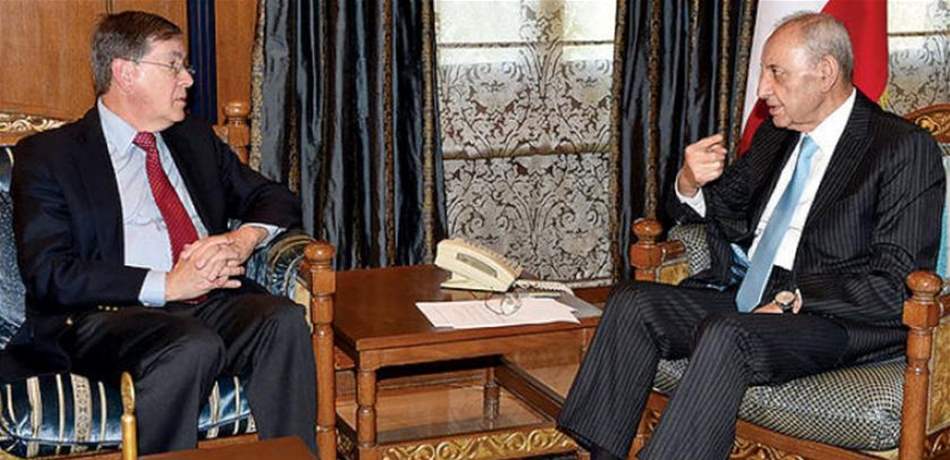Analysis/Trump’s Peace Plan Would Give Palestinian Refugees Many, Many Countries
تحليل سياسي من الهآرتس لزفي بارئيل: خطة ترامب للسلام تعطي اللاجئين الفلسطينيين بلدان كثيرة وكثير(توطين الفلسطينيين في لبنان مقابل السماح له استخراج الغاز والنفط)
Zvi Bar’el/Haaretz/May 31/2019
التحليل يتناول جهود السفير الأميركي ديفيد ساترفيلد التوسط بين لبنان وإسرائيل فيما يتعلق بترسيم الحدود بين البلدين والتوصل إلى اتفاق يرضي الطرفين للبدأ باستخراج الغاز والنفط على الحدود المشتركة والتحليل يقول بأن موقف أميركا المتساهل حيال لبنان إسرائلياً والذي يحمله سترفيلد هو في مقابل أن يؤيد لبنان خطة ترامب للسلام ويعطي الجنسية اللبنانية إلى اللاجئين الفلسطينيين المقيمين في لبنان
By taking a soft stance with Beirut in border demarcation talks, the U.S. is hoping Lebanon will provide citizenship to its Palestinian refugees and support its Mideast peace plan
American diplomat David Satterfield is currently shaking things up in Lebanon. In the space of about two weeks, the acting assistant secretary in the State Department’s Bureau of Near East Affairs has visited Beirut twice to mediate between Lebanon and Israel on demarcating the land and maritime border between the two countries. Satterfield, who speaks perfect Arabic and has served in the Middle East for about 40 years – including a stint as ambassador to Lebanon in 1998 – is a familiar but not necessarily well-liked figure among Lebanese officials.
Now that he is representing the Trump administration in such sensitive negotiations, he is perceived as mainly serving Israel’s interests, and that is precisely what the Lebanese are concerned about. According to Lebanese commentators, the demarcation of the Israeli-Lebanese frontier may be the focus of the talks, but as they see it, it is clear that there is also “a hidden agenda.”
The newspaper Al-Akhbar has reported that at a meeting about two weeks ago Satterfield presented hardline conditions for continued talks, reflecting a pro-Israel bias. According to the reports, the talks on the maritime border would be separate from the land border. The United States would be the only mediator and sponsor of the talks, and the negotiations would be conducted for half a year at most.
Lebanon rejected most of these demands. It wants the negotiations to be unlimited in time so that all of the issues are resolved, and demanded that the talks be under United Nations auspices, and that the two tracks, the maritime and land border, be discussed together.
Beirut believes that Israel is seeking to accelerate the negotiations so that it can can begin signing contracts for drilling in the Mediterranean with foreign oil companies, and without an agreement on the location of the border, no company will begin drilling.
But this week, according to these reports, Satterfield arrived with encouraging responses, to the effect that the United States (meaning Israel) is prepared to discuss the land and sea frontiers together and that the talks would be held under UN wardship – with the participation of American representatives. A territory swap between Israel and Lebanon was also proposed to make it possible to quickly demarcate the stretches of the border that are still in dispute, but talks do not include the frontier in the Shaba Farms area, which the UN Blue Line draws as part of the Golan Heights.
What caused the United States and Israel, which have usually been insistent over every comma, to retreat from their prior position? In Lebanon, the amazing flexibility is attributed to Trump’s peace plan for the Israeli-Palestinian conflict. The perception at this time is that the U.S. is pressing to bring Lebanon on board with Trump’s “deal of the century” by granting Lebanese citizenship to Palestinian refugees living in the country.
In the process, this is seen as defusing the issue of the right of return of refugees to Israel, which has been a major obstacle to resolving the overall Israeli-Palestinian conflict.
According to UNRWA, the UN’s Palestinian refugee relief agency, there are about 450,000 Palestinian refugees living in Lebanon. Amnesty International, for its part, pegs the number at about 300,000, and about two years ago, a Lebanese panel found that the real number is no greater than about 174,000, following a census taken for the first time in the country’s 13 official refugee camps and among concentrations of Palestinians elsewhere in the country.
The figure aroused major controversy in Lebanon, with Hezbollah and its political partners claiming that the census was conducted under American pressure designed to underreport the real numbers, thus making possible the claim that Lebanon can absorb a population of such size without particular difficulty.
From the Lebanese standpoint, it really doesn’t matter how many refugees are living in Lebanon. The Lebanese constitution provides that the country’s territory is indivisible and that refugees living there are not to be given citizenship. The official reason for this is that absorption of Palestinian refugees would harm the legitimacy of their claim to the right of return, would remove the primary basis for the fight against Israel and free it of historic responsibility for the refugee problem.
Lebanon’s Shi’ite Muslim Hezbollah movement has another reason to oppose giving the refugees Lebanese citizenship, related to the delicate demographic balance in the country, which dictates how political power in the country is allocated. Simply put, the addition of hundreds of thousands of Palestinian Sunni Muslims to the Lebanese population would undermine it. Hezbollah is concerned that the Trump peace plan, which according to recent leaks is expected to provide Lebanon with tens of billions of dollars either directly or through absolution of debt, would also seek to disarm the Shi’ite militia movement and neutralize its claim its weapons are necessary to help the Palestinians realize their rights.
For the Lebanese government, which so far has not been invited to the economic conference being held in late June in Bahrain, the plan is liable to provide an essential lifeline to extract Lebanon from its own economic crisis. Its debt is estimated at more than $85 billion (about 155 percent of its GDP). Its tourism sector is paralyzed and its trade with the Arab world has shrunk due to the war in Syria. This has rendered the country bankrupt, unable to invest in development and barely managing to finance ongoing activity.
But the issue of citizenship for Palestinian refugees is seen as a matter of national honor, as senior Lebanese officials deemed it recently. And that’s in addition to concern that giving Palestinians citizenship might also prompt the roughly one million Syrian refugees living in the country to demand similar status. The panic over the implications of the Trump peace plan on Lebanon has led Hezbollah to call for dialogue with the Palestinian leadership so they can work together to foil the plan.
Lebanon isn’t the only country concerned about Washington dictating a solution to the refugee problem. Jordan is horrified over the prospect that the U.S. will demand that it absorb hundreds of thousands or even about a million Palestinian refugees in the country.
Investigative journalist Vicky Ward recounts in her recently released bestselling book “Kushner Inc.: Greed. Ambition. Corruption” that the Trump administration’s peace plan envisages that Jordan would provide territory to the Palestinians and get Saudi territory in return. The Saudis, for their part, would get the islands of Sanafir and Tiran from Egypt.
It’s doubtful that such a territorial swap would be acceptable to the countries involved. Saudi Arabia has already been transferred the islands, following a confrontation with Egypt that ended with presidential approval to return the islands to the Saudis in exchange for generous economic aid. In Jordan, any territorial concession would be considered national betrayal, particularly if it is done in the context of a Trump plan that is viewed as an Israeli-American deal.
The exchanges of territory appear to be the magic formula that the Trump administration has adopted, and not just when it comes to Jordan. According to Ward, it has been proffered to Egypt that it give up territory in Sinai between Gaza and El-Arish along the Mediterranean coast to which a portion of the population of the Gaza Strip would be transferred. In return, Israel would give Egypt territory of equivalent size in the western Negev.
Israel would allow the Egyptians to dig an underwater tunnel between Egypt and Saudi Arabia that would include a rail line and oil pipeline. The funding for the projects would come from European countries, the United States and wealthy Arab states. Manufacturing plants, a port and an airport would be built in the Egyptian territory transferred to Gaza and Gazans and Egyptians would be employed there.






















